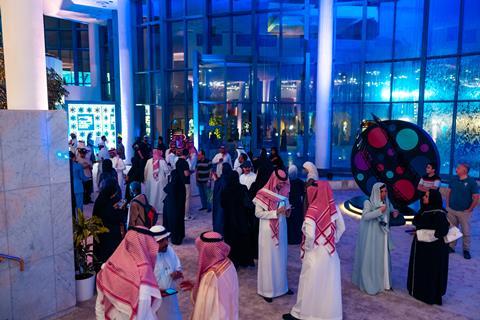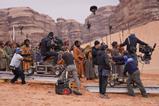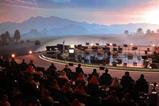
The International Film Criticism Conference held in Riyadh, Saudi Arabia, from November 7-9, lived up to its billing as a platform to facilitate cultural exchange and bolster the growth of the Saudi film industry.
The three-day conference gathered together 40 speakers from 22 countries, spanning international filmmakers, critics and producers, all meeting to foster cultural and intellectual exchange and contribute to the growth of cinematic criticism as a creative and evolving field.
With panel discussions, film screenings, and critical sessions, in addition to interactive activities that allowed audiences and critics to engage directly with filmmakers, the festival kicked off with a panel discussion with Italian filmmaker Marco Bellocchio.
Bellocchio recounted his career from his early debut in the 1960s with Fists In The Pocket (1964) to his recent work The Traitor (2019). He also explored the evolution of his artistic vision, his ongoing dialogue between cinema and personal memory, and the questions that have consistently shaped the core of his films.
The Italian auteur said a true critic sees beyond the frame, not just handing out stars or grades, but uncovering what even the director’s eye may have missed. “When an actor connects emotionally with the character, the performance becomes honest and full of life; that’s the moment a director knows the actor has found their path.”
He also said artificial intelligence “is indeed a real threat to our field, cinema carries within it the antibodies that protect its essence and allow it to endure.”
The panel was moderated by Riyadh-based film critic Firas Al Madi. Also participating was Erfan Rachid, film critic and correspondent from Italy for the pan-Arabic London-based daily Al Hayat and the coordinator of the Arabic section at Italian news agency AGI.
The conference boasted practical and applied workshops aimed at young critics and emerging filmmakers, covering areas such as critical writing techniques, visual text analysis, and the art of interviewing directors.
The second day included a panel discussion, Cinema Beyond Borders, in which the panellists were tasked with examining the artist’s departure from their homeland to work and how that move can leave a mark on their creative choices.
The conversation, moderated by critic Hussein Al-Daw alongside with Tunisian film critic Lamia Guiga, TV and documentary director and producer Mouhamed Keblawi, who is also a director of Malmo Arab Film Festival and Arab Cinema in Sweden and Iraqi filmmaker Mohamed Al Daraji, considered how leaving your home country to make a fresh life in a second country can affect both the selected themes and the narrative and visual style of films.
“Cinema, much like criticism and artistic production outside the homeland, is hybrid in nature, with a diverse identity,” Guiga said. “The experiences vary depending on the directors and the countries in which they work. A filmmaker’s identity blends with that of the producing country, because identity is not fixed, yet the director remains the central element.”

The participants also addressed the concept of cinema in exile and the impact of displacement on creative output. Keblawi described it as a bonus for home-grown audiences. “Directors of Arab origin living abroad belong to different generations and have lived rich experiences,” said Keblawi. “Their works carry messages that only an Arab viewer can fully grasp, even when produced outside the region.”
Mohammad Al-Daraji described projects from filmmakers in those circumstances as “the product of fluid identities shaped by memory and longing, combining anger, critique, and beauty all at once.
“Arab directors abroad create their films through the lens of their shifting identities and personal mindsets, driven by longing for their homelands, while expressing a mix of raw anger and delicate beauty at the same time,” he continued.
A further highlight of this year’s edition was a conversation between Abdul Jalil Al Nasser, director general for sector development and investment attraction, and leading international film critic Carlo Chatrian, who has also held roles as the artistic director of the Berlin and Locarno film festivals.
During the Reflections on Contemporary Cinema panel discussion, Chatrian engaged in an in-depth discussion about contemporary cinema’s transformations, the relationship between directors, their worlds, and audiences, and the role of cinematic and critical work in redefining the position of cinema today.
“My understanding of cinema only became clear when I began reading the writings of great directors who were originally film critics,” Chatrian said. “That’s when I realised that cinema is not just a medium for storytelling, but a way of understanding ourselves through the stories of others.”
Once a film is shown, it becomes something else entirely, Chatrian explained. “When you watch a film alone, your perception may be right or wrong, but in a full cinema everything changes,” he told the Riyadh audience. “Even the circumstances of that particular day can transform how audiences connect with it.”
Lebanese film critic Chafic Tabbara talked with Canadian critic, programmer and filmmaker Mark Peranson in a conversation titled Critical Crossroads.
Described as an interactive analysis of the aesthetics of cinema and the language of the image, the pair mulled the impact of digital technology now being used to create films, the difference between watching a film as a programmer versus a critic and why those differences exist.
“Over the past 15 years, film production has multiplied dramatically due to digital technology,” said Peranson. “I sometimes go through a thousand films a year. Programming requires a different kind of thinking: when I watch a film as a programmer, I’m not looking to analyse it; I’m assessing its suitability for screening, which section it fits into, which audience it speaks to, and whether it can resonate within the festival.”
















![[L-R]: Amanda Villavieja, Laia Casanovas, Yasmina Praderas](https://d1nslcd7m2225b.cloudfront.net/Pictures/274x183/6/4/1/1471641_pxl_20251224_103354743_618426_crop.jpg)







![My Dad The Truck [2] Square Image[98]](https://d1nslcd7m2225b.cloudfront.net/Pictures/100x67/7/7/2/1473772_mydadthetruck2squareimage98_640246_crop.jpeg)





No comments yet